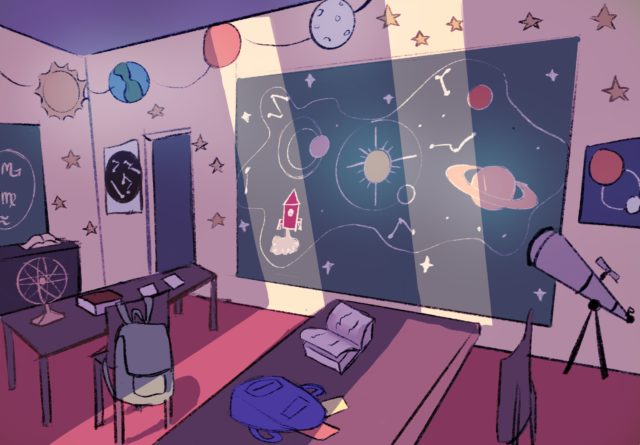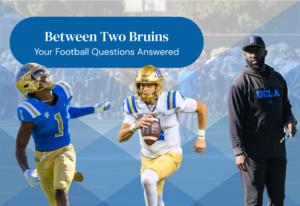This post was updated April 17 at 7:29 p.m.
The future hovers constantly on a college campus – careers, relationships, majors, course schedules. Its presence is always plagued by a certain level of uncertainty.
As a freshman, that uncertainty has started to press down on me. I thought once I started college, I would have more answers about what I wanted in life. But after finishing my first quarter and settling into campus life, my future was still unclear.
I tried to fight it – going to career center appointments and joining new clubs were helpful, but my efforts unpredictably fell short. No one could tell me what I should do with my life. Mostly, the advice was to try new things and take my time, but I didn’t want that. I just wanted to know how my life would unfold.
Strangely enough, I found comfort in an unexpected place.
At the start of winter quarter, I enrolled in a class called Classics 88GE: “Introduction to Greco-Roman Astrology.” I took the class as an elective, with no real expectations other than it would be a nice break from my heavy course load.
The class was filled mostly with people who, like me, needed to complete their general education requirements. The students in the small discussion room in Dodd Hall were quiet, waiting for a long lecture on history at 9:30 a.m.
I began to sit a little straighter when our professor, Lydia Spielberg, started taking us through math equations instead of star signs. We broke into small groups and were tasked with finding the exact orientation of the sky for a place and time of a birth using algebra.
Astrologers, we’d soon learn, weren’t just fortune tellers – they were mathematicians, artists, philosophers and more.
There was something in this class for everyone. While my strong suit wasn’t calculating time based on ancient concepts of day and night, my interest was piqued, and I wondered how else the topic would surprise me.
I didn’t expect it to challenge how I thought about uncertainty – or history.
Astrology is a subject that, to me, has always seemed somewhat insignificant – more of a hobby or fun fact, not something with real-world impact.
Yet I have come to realize that astrology was more than personal prediction or a compatibility test for first dates.
It was a cultural observation that looked to solve the same problems that I have.
Astrologers of ancient times dedicated themselves to discovering why the world worked the way it did and what its future could look like.
I tried becoming this type of astrologer myself while prepping for the course’s midterm, a horoscope reading done in the style of antiquity. I sat one of my friends down and rattled off her birth chart with terms I’d heard before but never really understood.
In her horoscope, Venus was exalted – which I now knew meant Venus was in a powerful place – and the planets were in interesting places.
When I looked into what this meant, though, I didn’t focus on the seemingly random facts it gave about her being pretty and loved by many, growing up to be a rich political leader and ultimately dying a tragic death. All of that could be disputed by other astrologers or even other aspects of her chart.
Instead I focused on what these astrologers were saying was important.
They wanted to know about romance and relationships, career aspects and lifespans. Even thousands of years ago, people were looking for the same answers I was.
By the end of winter quarter, I was convinced that astrology provides more than predictions about who I am most compatible with in a relationship. It shares unique insights into humanity through culture and history.
While I still feel uncertain about my adult life, astrology does provide some comfort.
This course showed me that humans have always been interested in knowing what the future holds.
People wrote stanza after stanza of didactic poetry interpreting stars, did complicated math to figure out ascendants – the part of a horoscope that represents what’s at the horizon – and pored over charts all just to uncover more details about their lives and the future.
It’s reassuring to know my peers and I are not alone in our fears of the unknown, nor are we the first generation to experience such fears. I don’t have all the answers, but I’ve come to accept that this is just a part of life.
I felt this way looking at the celestial globes in the Los Angeles County Museum of Art. Our professor had taken us to an exhibit there called “Mapping the Infinite: Cosmologies Across Cultures.”
Our assignment was to choose an artifact and write a research report on it. I was immediately drawn to a glass case with a statue supporting a globe inside – a piece by Willem Janszoon Blaeu.
The globe itself was in color, painted with images of the zodiac and constellations, along with tiny labels of what they were.
Globes like these were actually tools for astrology, even though they looked like decorative art pieces. It struck me then that although astrologers aimed to work out the hard questions of life, they never lost the beauty of their practice.
Instead of being overwhelmed with the ideas of fate and the infinite, they were enamored by them and worked this admiration into the tools of their trade. They dwelled on life, but they also appreciated it.
Maybe astrology, I thought, was a lesson on finding the value in life just as much as it is predicting it.
As winter quarter wrapped up and this class came to a close, I came to the conclusion that while my future may be unpredictable, that’s a pretty universal experience. It also just means that I’ll have to experience life in the present – the ups, the downs and all the beauty in between.
And if I am ever really feeling desperate, I now know how to accurately interpret a horoscope, so maybe I’ll find some solace in that.




Comments are closed.